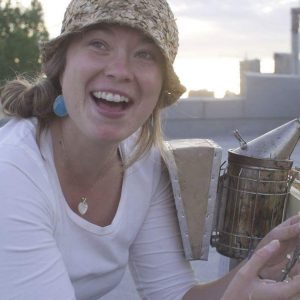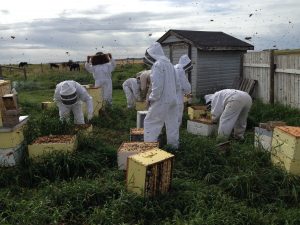Eliese Watson: Inclusivity and Room to Grow in Beekeeping

Eliese Watson of ABC Bees in Alberta, Canada was 18 and working at a local gas station when a “tiny ancient old man came in” who turned out to be a beekeeper and offered her his bees. She turned him down at the time, but four years later, at a friend’s house, she met a rural beekeeper who had acquired the bees of this same old man after he died and this time she couldn’t refuse.
“From the first day I was beekeeping in those hives, I was stung and I was stuck on bees. And I never looked back,” says Eliese. That was in 2008.
Eliese offers mentorship programs in beekeeping free of charge, the only model like that in her area. Participants apply and are required to come once every two weeks for six hours and work the yard with Eliese. In her program, they learn how to make splits, how to raise queens naturally through the and , and run two queen colonies. Eliese also teaches intermediate and advanced beekeeping that applies to treatment-free management and how to identify certain traits that are adaptable to illness in an apiary.
ABC Bees runs programs through charities and nonprofits and puts their hives in public places, including the largest urban farm in Canada called Grove Calgreen. ABC Bees has been on the farm since they opened in 2005. The farm runs a lot of kids camps and field days for the public so the community gets to engage with the bees there. ABC Bees also does a lot of outreach to children and people with disabilities and to people with intermediate and advanced skills in beekeeping looking to raise their own queens. The landscape of the beekeeping audience is also becoming more diverse than it once was, with a lot of refugees coming into Canada, especially from Syria. The climate in Northern Syria and Canada is similar and a lot of refugees are coming from an agrarian background. “You don’t have to speak English to understand how bees work,” says Eliese. “The bees there and the bees here are the same. You can beekeep anywhere, even with a language barrier.”
Alberta is the fifth largest honey producing region in the world, with an average yield per colony from 120-1260 pounds surplus. When Eliese first looked into beekeeping, there were less than 200 beekeepers in the whole province; the average beekeeper was over 50 and had over 16 years of experience, which meant there weren’t many resources or education around.
Starting from a grant, Eliese launched a project to bring in an educator to teach a beekeeping course for “true beginner beekeepers” in 2010 and the project was “explosive.” The workshop was so successful, that they continued to offer it and from there ABC Bees grew as the educational business it is today. ABC Bees’ focus on advocacy for legislation and municipal regulation of beekeeping came out of public demand.
Offering programming for beginners to the advanced, Eliese has focused on how to make sure the learning environment is as inclusive and exploratory as possible; a “space where everyone can feel comfortable and welcomed to say, ‘I don’t know, let’s find out.’” Eliese has found that at the commercial level of beekeeping, there’s a tension between each beekeeper thinking their way is the only right way and that any type of conversation is by default an argument. And on the research level, she’s found a polarity between researchers and scientists and beekeepers who work with bees every day. It’s a crazy world sometimes, “which is so funny”; a beekeeper could have a best friend who is also a beekeeper but “will manage things totally different,” says Eliese, “and they will openly argue and neither one of them will budge.”
The introduction of ABC Bees in Alberta “revolutionized beekeeping in this province,” says Eliese, “from being an elitist large-scale commercial operation where the only people who can keep bees are the people who come from a history or past who know the whole legacy of beekeeping, to now transitioning into hobby beekeepers or even people who are getting into beekeeping commercially, like myself.” Eliese has noticed a dramatic change in the industry with more beekeepers now than in 1986. There’s also the reality that bees and equipment are not allowed for import into Canada and so over 90% of beekeepers in Alberta have under nine hives.
Eliese sees an interesting contrast between beekeeping in larger densely populated places versus rural places and sometimes an ideology resemblant of a “God complex” in many urban beekeeping situations. She warns against keeping the dialogue to only focus on bees as a political statement and not include a balanced conversation about the actual health of the bees. For example, if you’re keeping bees and living in an environment where the natural landscape provides scarce food for bees, how are you keeping them healthy? How are you ensuring that just because you want to raise bees, you are also being responsible for taking care of them?
As a treatment-free beekeeper, it can be a challenge on either side of the coin, urban vs. rural, because in many rural settings where people come from a strong agrarian background, they may have a stronger affinity to agro chemical applications, says Eliese. “I breed treatment free stock” and because so many are used to chemical management, “I am a heretic in my own backyard.”

While Eliese has not used chemical treatment in her bee management, she is not dogmatic in telling everyone to go treatment-free because “if a person is going to treat, I want to make sure they have as many resources as possible to do it as safely for themselves and the bees,” says Eliese. More important than preaching only chemical-free treatment, Eliese believes beekeepers should be making critical decisions based off the facts of their unique situations and “being accountable for the decisions you make in your operation.”
Most of Eliese’s public outreach encourages different communities to start their own bee clubs. “I really encourage a self-sufficiency model of leadership, and organic evolution of whatever their club desires,” says Eliese. “Kind of like a swarm, you give them all the resources they need to be viable but it’s up to them to actually drive.”
And for those starting up beekeeping as a hobby, Eliese recommends joining a community of beekeepers “to kind of mimic a hive because it can be extremely overwhelming to enter a box of insects that maybe want to kill you,” says Eliese. So it’s nice to go through that experience with someone else.
Media Attributions
- Eliese Watson © Eliese Watson is licensed under a All Rights Reserved license
- ABC Bees © Eliese Watson is licensed under a All Rights Reserved license
Shaped comb or foundation is placed in the middle of a brood box of a selected colony. The queen lays in it and the bees extend the bottom and fill the gaps, allowing the queen to lay in the extensions a few days later. When the eggs start to hatch it is removed from the colony, the bees removed and the comb is cut back to where the larvae are 24 – 36 hours old, i.e. 4 – 4 ½ days from the egg being laid. The comb is then placed in a cell raising colony and the bees build Q/Cs on the exposed edge.
Grafting is the most common method of queen rearing and is used worldwide. It involves the transfer of larvae that were intended to be workers into queen cell cups.


Feedback/Errata